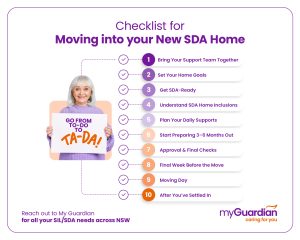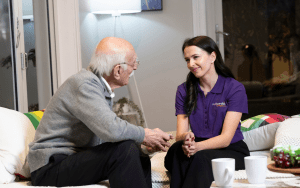How do you know when it’s time to have the home care conversation with elderly parents or grandparents? Especially if you live some distance away, it’s often difficult to tell over the phone if a loved one can take care of themselves independently. And it’s when you visit around the holidays or a birthday it becomes clear a loved one needs home care assistance to live safely at home.
Red flags to watch for are piles of unopened mail, including unpaid bills or overdue notices. If your loved one’s refrigerator is almost bare and they seem to have lost a lot of weight, this could be an indication they’re unable to care properly for themselves. Perhaps their hygiene is suffering, their clothes look unwashed, or the house is dirty. These are signs they need help, not necessarily that they need an assisted living facility.
Elderly care services can help loved ones remain safely in their own home where they feel comfortable surrounded by a familiar environment. Part of offering help might include home health care objectives if your loved one need help with chronic health issues. Or they just may need help with personal care services like bathing and dressing, housekeeping to keep their home clean, and nutrition support like grocery shopping and cooking.
How to have a conversation about home care services
Some elderly loved ones are embarrassed they need help and may refuse. They may not want “strangers” in their house or feel this is the first step in losing their independence.
Don’t let this deter you from having the conversation. It can be awkward, especially for the child to convince their parents that they’re right. But if you come to the conversation from a place of compassion and empathy, it will be easier.
Here are a few tips to make the conversation go better.
- Timing is everything. Most people have more energy in the mornings when things are calm. Fix a healthy breakfast and then start the discussion.
- Put yourself in their shoes. Imagine having a stranger in your house. How would you feel, especially if you felt they were threatening your independence? Explain that home care services actually support your loved one’s independence. Instead of trying to take care of everything, home care assistance lets them spend more time doing what they enjoy. In fact, they’ll have more freedom to pursue their hobbies and dreams.
- Put them at the decision-making helm. Assure them that the final decision on specific caregivers is in their hands. If they’re not comfortable with someone, you’ll find a replacement your loved one feels more comfortable with. Let them know that most caregivers form special bonds with those they help and become almost like family.
Final thoughts
Once everyone agrees that home care assistance is a good idea, start with a needs assessment. Whether you go through My Aged Care of the Australian government or look at private home care services, contact a professional to help you decide what services are needed.
Finally, don’t worry about having the “big talk.” Take it slow and have a series of small conversations. Start with, “Wouldn’t it be nice to have someone clean the house so you can spend more time with your book club friends?”






